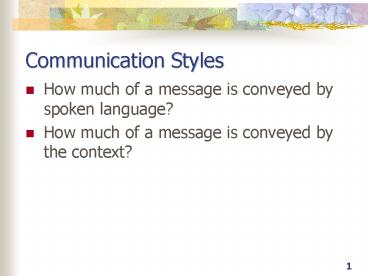Communication Styles - PowerPoint PPT Presentation
1 / 20
Title:
Communication Styles
Description:
Communication Styles. How much of a message is conveyed by spoken language? ... Theories of Cultural Change. Cultural borrowing and innovation acceptance ... – PowerPoint PPT presentation
Number of Views:306
Avg rating:3.0/5.0
Title: Communication Styles
1
Communication Styles
- How much of a message is conveyed by spoken
language? - How much of a message is conveyed by the context?
2
Communication Styles
- Low-Context Culture
- Information is explicit
- The message intended is mostly contained in the
words spoken - High-Context Culture
- Information is implicit
- Spoken words only contain a small part of the
message - Recipient must infer the rest by context
3
Systems of symbols in a culture
- Rules and customs
- Nonverbal communication
- Spatial relations (proxemics)
- Rewards and gifts
- Conceptions of time
4
Conception of Time
- Monochronic
- One thing at a time
- Time is linear
- Polychronic
- Multiple things at once
- Time is fluid
5
Conception of Time
Monochronic Culture Polychronic Culture
Interpersonal Relations Interpersonal relations are subordinate to present schedule Present schedule is subordinate to Interpersonal relations
Activity Co-ordination Schedule co-ordinates activity appointment time is rigid. Interpersonal relations co-ordinate activity appointment time is flexible
Task Handling One task at a time Many tasks are handled simultaneously
6
Conception of Time
Monochronic Culture Polychronic Culture
Breaks and Personal Time Breaks and personal time are sacrosanct regardless of personal ties. Breaks and personal time are subordinate to personal ties.
Temporal Structure Time is inflexible time is tangible Time is flexible time is fluid
Work/personal time separability Work time is clearly separable from personal time Work time is not clearly separable from personal time
7
Elements of Culture
Institutions Within Culture
Cultural Activities
Inner Core
8
Pivotal Institutions
- Social institutions provide basic structure
within which we live our lives - Emerge around a fundamental human need which must
be met for individual survival and prosperous
society
Economic Educational Political Religious Famil
y Health
9
Social Institutions
- Formal Institutions
- Deliberately brought into existence to enable
people who do not know each other to carry on
relationships for the purpose of attaining
specific goals - Informal Institutions
- Authority and status attained through
interpersonal relationships or other
non-structured means
10
Economic Institutions
- Some form of compensation for time or work
- Economies differ in amount of governmental
interference - Communism, Socialism, Capitalism
- Function Allows individuals to specialize in
skills and still meet needs - Barter system or swap out work
- Money
11
Political Institutions
- Some form of government
- Provide peace and order within society
- Protection from enemies outside society
- Use of force concentrated within government
- Legal system
- Military establishment
12
Function Social Control
- Groups must ensure that members obey at least the
rules vital to survival of the group - Physical force
- Economic pressure
- Occupational pressures
- Sanctions
- Positive
- Negative
13
Family as an Institution
- Laws and institutions surrounding family and
kinship systems - Nuclear family units
- Mom, Dad, siblings
- Extended family units
- Includes nuclear family and aunts, uncles,
cousins, grandparents - Authority and inheritance
- Matrilineal
- Patrilineal
14
Educational Institutions
- Formal agencies in which students learn
- Important history
- Skills
- Socialization
- Cultural differences in education
15
Religious Institutions
- Formal systems involving
- Belief
- Rituals
- Places of worship
- Linguistic concepts
16
Health Institutions
- Meaningful health can differ by culture
- Physical and mental health evaluated differently
according to culture - Modern medicine vs. traditional healing
17
Theories of Cultural Change
- Cultural borrowing and innovation acceptance
- Contact with a new culture produces change in one
or both cultures - Diffusion Cultural traits spread from one group
to another - Innovation New elements or combinations of old
elements are absorbed
18
Theories of Cultural Change
- Cultural Crisis
- Changes are the result of uncontrollable forces
- Ecological Change
- Changes as response to long-term environmental
changes
19
Theories of Cultural Change
- Dominant Theme Analysis
- Fundamental cultural themes a dominant force in
action and thought
20
Theories of Cultural Change
- Cyclical theories
- Cultures fluctuate some rise to dominance over
other cultures, some decay and fall to ruin

